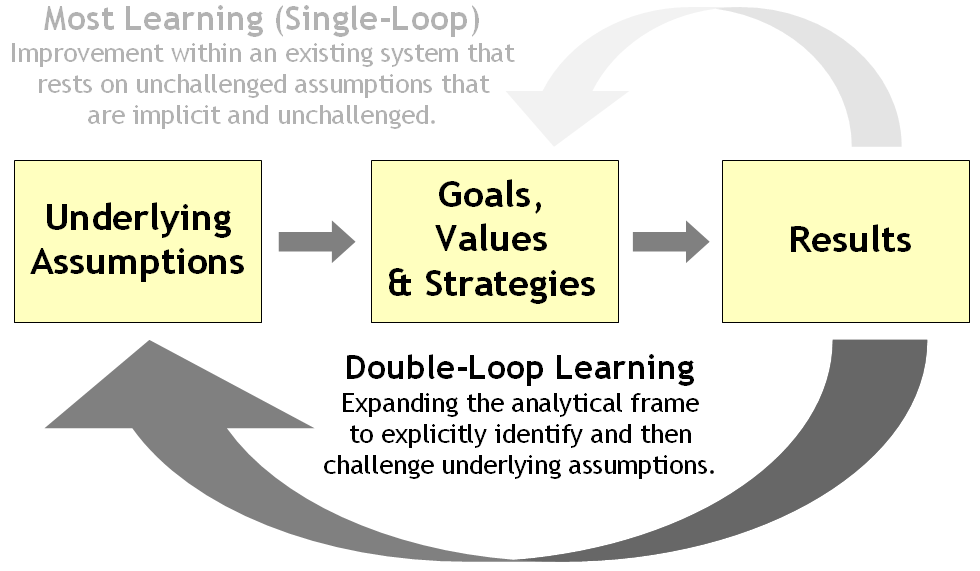So, I read Chris Argyris’ exploration of double-loop learning. Three times. I started it around seven or eight times. I have no clue what it is. None. All I got was that single-loop learning is defensive, in that when something goes wrong the organisation will analyse the situation and modify its practice in order to avoid the problem in the future. Thus double-loop learning is… Presumably the opposite? Perhaps it preempts possible issues and adjusts according. Maybe it’s not problem-based, and is simply based on effective analysis and consistent improvement over the course of the organisation’s existence.
In an attempt to get a grips on the theory, I followed the advice given in the first ‘unlecture’ and found a diagram of ‘double-loop learning’.

This is significantly more useful than Argyris’ intellectual jargon. I mean, I need to double my IQ before I will get a grips on that one, as well as make myself considerably more boring. No offence to anyone who read it and understood it, though I really just called you incredibly, incredibly smart.
Anyway, the diagram shows that double-loop learning is actually using the results of a process to re-evaluate the ‘underlying assumptions’ we made. I definitely get that more, but to be honest I don’t really see how that makes anything easier. Seems to be one of those supposedly revolutionary new ways of thinking that really just complicates a simple system, and a system that is used in most cases because it works well. Yes, it’s defensive, but often the possibility of failure is not properly discernable until the results come though, and then we simply have to fix what went wrong. If that doesn’t work, sure go all the way back and completely change the deeper concepts that you hadn’t questioned in the first place (examples please?), but if it does then I’d say just don’t bother making it harder than it needs to be. The easier it is, the better. I’m not just being lazy. In fact, single-loop learning sounds more like standard perseverance, attempting the goal through multiple failures. Double-loop learning sounds like ‘oh, it didn’t work, let’s try something COMPLETELY DIFFERENT’ and I don’t agree with that. Well, sometimes I do. But not always. Not often. Occasionally, at best.
I decided to find some double-looped learning examples, one of which can be found if you click on the nice hyperlink right there. This one talks about a date in which you tried to go on a picnic with someone, only to find the wind is moving your blanket around. It classes using rocks to hold down the blanket (and steadily increasing sizes of rocks when that fails) as single-looped learning, as it is simply a defensive manoeuvre against the wind-problem, while it implies that completely changing the plans and going somewhere else, or perhaps having the picnic on the ground, or doing it another time, as double-looped learning, since having a picnic then and there are – as Argyris put it – the governing variables in this situation, and is what a good double-looping learn-y thing would reconsider once their potato salad starts assaulting the picnic blanket. Yes, that was a giant sentence.
That is a perfectly reasonable example, and one where reconsidering the picnic is obviously the smart answer. But what if we can’t double-loop or whatever? What if we have a strict deadline, a strict goal, blah blah blah blah, i.e. write a professional blog that each weeks contains posts about readings, unlectures, Networked Media and stuff not about Networked Media? What are the governing variables here?
The blog format is a governing variable. We can’t modify that too much, as there is a certain post-quota we are expected to provide. If we, say, shifted over to Twitter and tweeted our posts of no more than 140 characters long we wouldn’t do so well.
What about the weekly deadlines? Well since we can’t shift tutorials and in every tutorial our weekly progress is assessed, these are pretty concrete too. Unless we lie, since the tutors aren’t really checking our every post every week. Unless they are, in which case that’s really sad. REALLY SAD. Sorry, Elliot, but REALLY SAD.
Another governing variable… well, maybe we could do a shared blog? I mean, I already am kinda doing that by having my weekly guest blogger (I’m thinking Dilruk Jayasinha this week), and I see nothing wrong with that. However, if I were to move over to say… Dani Leever’s blog and post a few things about Networked Media, then have her come over and post a few things on mine, whose would be whose?
Another wacky, double-learning or whatever idea? Let’s drop out!
BYE
